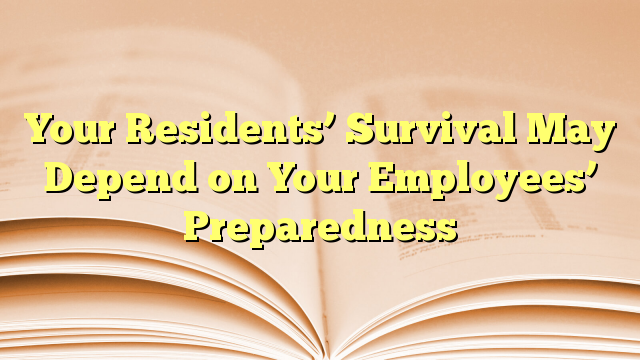by Kim Jimenez
With recent events all over the nation, paralyzing ice storms in the east, tornados in the Midwest, fires and mudslides in the west, we can’t help but say once again: Do you have emergency plans and processes in written form? Has your staff, your entire staff, been trained?
We cannot emphasize enough the need for disaster planning/emergency preparedness and related training. Even if you have the best thought-out plans sitting in that binder on the shelf, those plans will fail if they are not conveyed to all levels of staff. Even if a community’s upper management/administration knows what to do, they may not be on site during said emergency.
- How practical are your plans?
- Are your plans accessible and executable? A written plan that can’t be executed is worthless!
- Can these plans be executed rapidly, efficiently and effectively?
- Have you given your entire staff ample opportunity to review, practice, clarify or ask questions about your emergency procedures?
A Plan No One Knows Is Really No Plan At All
In regards to this last item; let us again underscore the need to convey plans to your employees, train them, train them some more and schedule periodic training and review of these plans. Yearly is a good place to start according to OSHA but we would recommend more frequently as your employees don’t just have to get themselves out of harm’s way, but must know without hesitation how to assist your residents. As with anything else, the more everyone is exposed to these plans the more likely they will be successfully and effectively implemented. There will also be a need to address some of your standard policies when facing an emergency. Some policies, which may be pretty straight forward on a typical day, may need a different interpretation during an emergency; different scenarios may require different responses regarding a stated procedure or policy. In an emergency, there may not be time to question and clarify; staff will need to take immediate action without delay.
One Plan Will Not Fit All Situations
What are some events you need to plan for?
- Medical Emergency
- Fire
- Flood
- Tornado
- Hurricane
- Electricity failure
- Running water/hot water failure
- Intruder on premises
- Acts of violence
- Hazardous materials spill
- Evacuation by authorities
- Missing resident
These are just a few of the scenarios you need to consider.
Have you considered different variables to these situations: various times of day (where are your residents? In their rooms sleeping, gathered in the dining room, etc.) Consider varying levels of staff on site (day shift, night shift, weekends, etc.). What are your plans to ensure operation of resident equipment and ample supply of medications?
And keep in mind, if your community is experiencing a natural or other unexpected disaster or situation, your employees are more than likely experiencing the same thing. Your employees homes may be flooding, downed trees and power lines may prohibit them from getting to your community, they may be tending to young children if local schools have been affected as well. Consider this when making your plans, and your alternate plans. Yes, you may need alternate plans in addition to your master plan.
So Many Questions!
How about technology concerns; have you backed up all your records and information to an off-site location? Be it a paid service or a server provided by your parent company, as long as it is far removed from your location, make sure this is done. Events such as tornadoes, floods and fire can wipe out all your paper and computer files on site.
Is your contact information current and correct? You will need more than just 911. Contact info needs to include emergency responders, utility companies, staff, resident families, corporate contacts, insurance representative to begin with.
What about the aftermath of emergencies? Do you have a plan for recovery? Do you have ample insurance to cover any and all types of emergencies/disasters? Have you reviewed and updated your policies lately?
All this may sound overwhelming because of its scope and importance. There are many resources available to help you update or form your emergency preparedness/disaster plan. Many states and/or state organizations have templates that conform to their state specific regulations, industry associations have guidelines and many private companies offer their services in helping you prepare a plan of action.
Here are just a few resources to review:
Emergency Preparedness Tool Kit from ALFA.org
Updating Your Disaster Plan from LeadingAge.org
Department of Labor; Occupational Safety & Health Administration (OSHA)

